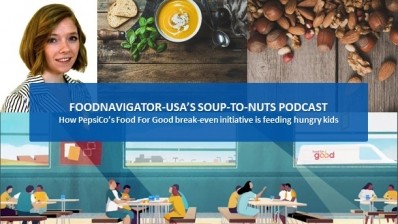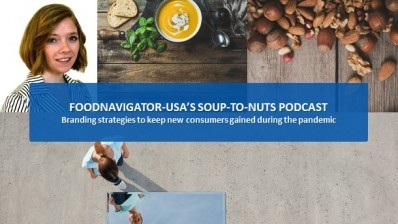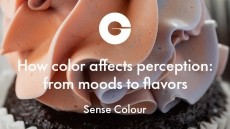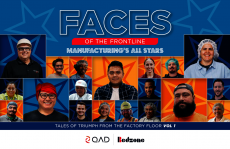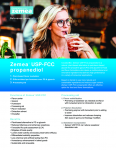Soup-To-Nuts Podcast: Muniq offers ways to close the race-related health disparity gap with nutrition
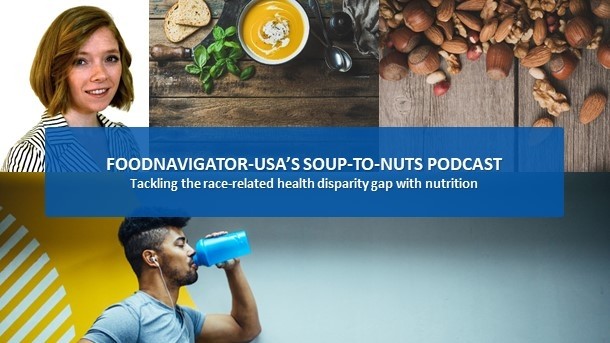
As a first step in this ambitious goal, the new company launched this spring a line of nutritional shakes, under the brand Muniq, that leverage resistant starch to strengthen gut health, stabilize blood sugar levels and tackle many of the chronic diet-related diseases or so-called “underlying health conditions” that make some people more susceptible to the coronavirus and other potentially lethal ailments.
While the science-backed benefits of the shakes are fundamental to how Muniq helps consumers turn the tide on their health, company founder and CPG industry veteran Marc Washington explains in this episode of FoodNavigator-USA’s Soup-To-Nuts podcast that the brand also aims to “democratize gut health for the masses” and in doing so break down racial and socio-economic barriers to good health. He explains that Muniq and Uplifting Results Lab does this not only by providing shakes that Washington says taste good, but with easy-to-understand educational content on Muniq’s website and through the brand’s direct-to-consumer subscription model.
[Editor’s Note: Never miss another installment of FoodNavigator-USA’s Soup-To-Nuts podcast – subscribe today.]
Tackling the health disparity gap
Since the pandemic was declared in March, research from the Centers for Disease Control and Prevention reveals that racial and ethnic minorities are disproportionately affected by COVID-19 with non-Hispanic American Indian or Alaska Native people being hospitalized 5.3 times more often than non-Hispanic white people, and both non-Hispanic Black and Hispanic or Latino people being hospitalized 4.7 times the rate of non-Hispanic white people.
This discrepancy is attributed in large part to people of color suffering from underlying health conditions at higher rates than white Americans, including diabetes, which the American Diabetes Association says afflicts 14.7% of American Indians/Alaskan Natives, 11.7% of non-Hispanic Blacks and 12.5% of Hispanics versus only 7.5% of non-Hispanic whites. Similarly, CDC research shows that 49.6% of non-Hispanic Blacks struggle with obesity, followed by 44.8% of Hispanics and only 42.2% of whites. Finally, CDC data shows that hypertension also impacts non-Hispanic Blacks more than non-Hispanic whites at 40.3% versus 27.8%.
For Washington, these grim statistics confirmed a need and opportunity to use food as medicine to help lower the rates of diabetes, obesity, hypertension and other chronic diet related diseases for all people – but especially those who need it most, including multicultural communities.
“There is undeniably a significant gap … in these health outcomes for multicultural communities, and unpacking the why is a complex thing. There are just so many variables that have led to it,” including access to healthcare, the decisions healthcare providers make for people of color, access to healthier food options in food deserts, and other elements, he said.
While Washington says a driving force behind Uplifting Results Lab is to improve the health of “the masses” and help close the race-related disparity gap, he adds that the real inspiration for Muniq is much more personal.
“Growing up in our house, we had a number of health issues. It was relatively typical: weight issues, my dad was diabetic, my sister also lived with diabetes as well … and she had hypertension and she tragically passed away five years ago due to health complications during childbirth – and that, as you can imagine, deeply affected me to my core,” Washington said.
He explained that while she tried many different potential solutions to manage her health, none of them “stuck” – prompting Washington to create a product that he believes would have empowered her and will help others to lead a healthier life.
Washington added as Black founder of a health and wellness business he feels a sense of obligation to make a positive difference for multicultural communities. As such, he says he not only wants to create products that target their needs, but he also wants to show in his marketing and brand representation how his products help people of color.
“I think representation really does matter, so when you go to our site, you see our promotional materials have the full diaspora. It is very, very intentional to show everyone that this can be a solution for them, including Black and brown communities,” he explained.
Direct-to-consumer model skips over traditional barriers
Washington’s go-to-market strategy for Muniq also was shaped by socio-economic and race-related factors that historically have restricted multicultural communities’ access to some better-for-you and health-focused products.
Recognizing the prevalence of food deserts and restricted distribution in many communities of color, Washington opted to bypass traditional distribution and go straight to consumers with a subscription service that not only would simplify and increase access, but also reinforce the need for long-term lifestyle changes.
The direct-to-consumer online marketing model also allows Washington to drive traffic to the company’s website and community platform where he has space and time to explain in easy-to-understand terms how Muniq works.
“From an awareness standpoint, a big part of our ethos is how do we translate this so that it’s not just the PhD and the 1% that understand and are doing things about their gut health, but something that can be democratized and for the masses so that we can help,” he said.
Helping consumers connect the dots between nutrition and their health through the microbiome is just the beginning for Uplifting Results Lab, says Washington, who notes that the food as medicine is gaining traction as more people look for a proactive approach to wellness.
Ultimately, Washington said, he hopes to build on this momentum to expand the Muniq line and create a personalized wellness brand with many solutions for many people, as well as a network where consumers can turn to each other for support and guidance to increase “their hope, health and happiness over time.”


